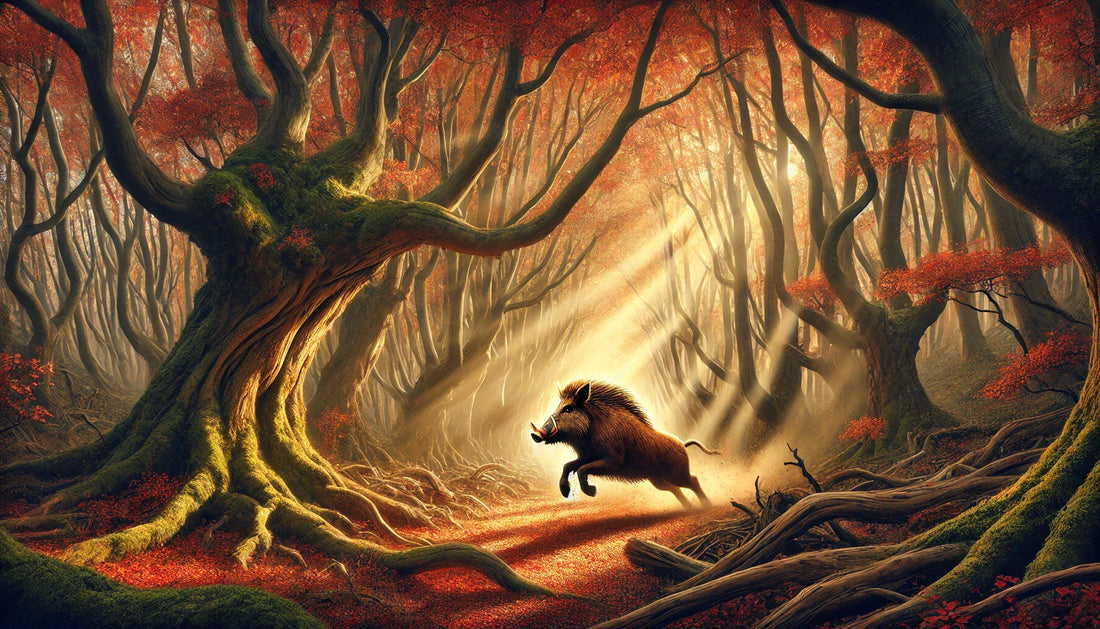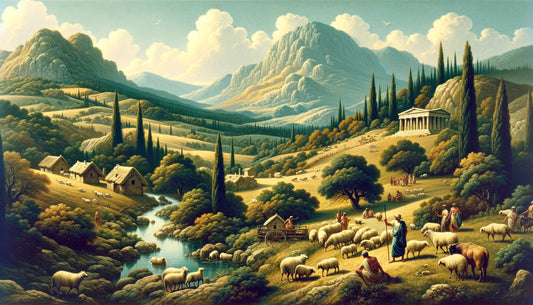
The Erymanthian Boar — Hercules’ Fourth Labour
Continuation of the story The Ceryneian Hind.
"I want you to capture alive the wild boar that roams free in the region of Erymanthos!"
With these words, King Eurystheus dismissed Hercules from the fortress. He did not want to see him after the humiliation he suffered with the escape of the hind, not to mention the frustration and rage he felt over the victory in his third labour. "How did he manage to deceive Artemis with that sacrilege?" he pondered.
Meanwhile, Hercules was already setting off westward across the peninsula to find the animal. It was not nearly as well-known as the creatures from the previous tasks. He knew very little about it, so he had to be cautious.
The Skill of the Boar
Two days into his journey, the hero arrived at the foot of Mount Erymanthos. He knew the boar inhabited this area, but he had to think about how to find it. Relying solely on noise and footprints could take a long time.
Since it was autumn, he quickly knew where to start. At this time of year, acorns fall from the trees, and these fruits are a delicacy for boars. Thus, he headed towards the areas densely populated with oak and holm oak trees at the foot of the mountain.
Within a few days, he had located it. He observed it from a distance, just as he had done in his first labour with the lion. The boar was not nearly as dangerous, but caution was needed to study how to capture it. For its part, the boar realised more than once that someone was lurking nearby. It knew its territory well and did not overlook anything that entered or exited.
After seeing none of the previous complexities, Hercules decided to go for the capture. The boar detected him immediately and started to run with surprising agility and speed. After a long chase, Hercules withdrew to wait for another attempt. He tried again. Time and again. Day in and day out. Neither stealthily nor with ambushes did he succeed. The boar had every situation under control.
Amid the chases and movements, he realised he was in a very familiar terrain. Not far from there lived a particularly special friend of his. Before continuing the hunt, therefore, he considered taking a break and went to pay him a visit.
The Secret of the Hunt
Pholus lived inside a large cave with his community of centaurs. The centaurs were beings of divine descent: a hybrid race composed of half man (from the head to the waist) and half horse (from the waist down). They were known for their extraordinary strength and bravery, as well as being experts in archery. However, they had a significant weakness for alcohol, a temptation very difficult to resist that led them to lose control and become violent and surly.
Hercules arrived and was warmly received by his friend. It had been a long time since they had seen each other, and the reunion was a pleasant surprise. They caught up for hours, so much so that Hercules was able to explain the redemption he was undergoing through the labours assigned by King Eurystheus.
"Catching the boar might seem an easy feat, but it is swift and skilled at slipping away. It will leave you exhausted with each attempt," the centaur confirmed.
"And what is that? Is there an obvious way to catch it without harming it?"
"The winter snow will help you accomplish this. If you wait for a snowdrift to form here, at the foot of the mountain, you'll see how it won't escape so easily."
Hercules' face lit up upon hearing his friend's great idea.
"Winter will arrive soon; just be patient," he continued. "Meanwhile, why not stay with us in the cave? We'd be glad to have a stranger around for a few weeks."
"I doubt I'd be better off anywhere else! I really appreciate it!" he responded.
The Banquet’s Incident
The days were passing, and the cold was beginning to settle in the region. Spending this time in company made the wait entirely pleasant for Hercules. One evening, while dining with Pholus, he asked about a large stone jar that was there.
“It’s a gift from Dionysus. Inside there is wine he created himself, as exquisite as no other!”
Hercules was astonished to hear this. He did not want to leave without having tried it, so he insisted his friend serve him a glass. Initially, Pholus did not want to open it, but he also did not want to be rude to his friend and guest. Thus, they ended up serving themselves a glass.
Time stopped as they savoured that divine delight. It was not only sublime but also as potent as no other. In the blink of an eye, that corner was filled with centaurs attracted by the smell of the drink. Pholus, seeing the crowd, tried to stop them. They had only opened the jar to offer a taste to their guest, he argued. Nonetheless, some centaurs saw it as a selfish act and confronted Pholus. Hercules quickly intervened in the argument to defend his friend. From shouting, it escalated to shoving and then to blows.
The Tragedy of the Cave
The brawl was underway! More and more individuals got involved, and from fists and hysteria, it escalated to weapons. Some centaurs drew their bows to threaten Hercules. Whether due to alcohol in the blood or clumsiness, he responded by throwing a table to the ground to use it as a barricade. Quickly, he also took up his bow.
Arrows began to fly. The table managed to protect Pholus and Hercules, but the other centaurs were not so well protected. The arrows shot by Hercules hit their marks, and shrieks of hysteria and pleading took over the cave. Pholus could not believe the situation. He began to shout insistently to stop the madness and restrained Hercules by his side to end the battle.
Calm was restored, but there were several centaurs dead on the ground and others still bellowing in pain. Pholus approached to understand what was happening to them. Then, he picked up one of the arrows Hercules had shot. He didn't understand what was happening. They were the same arrows that the hero had dipped in the blood of the Hydra. As Hercules approached to explain, the arrow fell from his hands and pricked him on the skin above the hoof. Within minutes, Pholus's body lay lifeless on the ground.
No one could believe what had happened, the damage they had all caused. The first to feel ashamed and remorseful was Hercules. With all the sadness in the world, he helped the remaining centaurs bury their fallen comrades. Then, he left the cave to focus on his task and turn the page on this tragic episode as soon as possible.
The Capture in the Snowdrift
With the mountain and forests blanketed in snow, Hercules followed the boar's tracks. It didn’t take him long to find it. Remembering the advice of his deceased friend, he began to chase the boar through the snow, trying to drive it towards the snowdrifts.
The advice proved very useful, and Hercules soon captured the boar. Once he had it pinned down, he tied its legs and hoisted it onto his shoulders. Then, he began his journey back to Mycenae.
Upon arriving in the city, the citadel guard let him enter with the massive beast over his shoulders. They knew what the king had ordered and allowed him to pass. Once inside the throne room, he lowered the boar from his back to deliver it to the king. Eurystheus, surprised by the animal and seeing it continue to move, jumped scared and hid behind a large stone jar.
"Where are you going? Here is the boar, just as you requested," asked Hercules.
"Take it away from here quickly, I don’t even want to see it!"
"But didn’t you ask for it alive? Don’t you even want to examine its beautiful tusks?"
"Out! I said out!"
Thus, Hercules once again hoisted the boar to release it outside the city. He had successfully completed his fourth labour.
Continues with The Augean Stables.
Honouring the Legend
Although we would like to offer you a fabric made from the beautiful tusks of the Erymanthian boar, such skins no longer exist today. Instead, we want to offer you this magnificent t-shirt that pays tribute to the magnificent animal that once lived at the foot of Mount Erymanthos in Greece.

As we cannot provide you with a sacred piece, we do not want to sacrifice any animal for a piece of clothing. All our items are 100% cotton and made with the utmost respect for the environment. LũM always aims to respect the flora and fauna of our planet.
Thank you for your trust, and may the adventure continue!
Reading list
- Labours of Hercules. Wikipedia, the Free Encyclopedia.
- Fry, S. (2018). Heroes. Penguin Books.
- Hamiltor, E. (1942). Mythology, Timeless tales of Gods and Heroes. Little, Brown and Company.
- Graves, R. (1955). The Greek Myths. Penguin Books.


